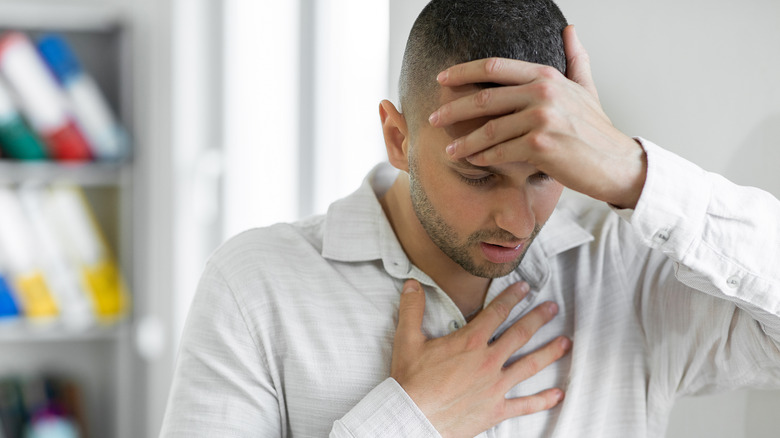During your run, a dog comes out of nowhere with teeth bared, and you jump into action. Adrenaline hits your veins with the intensity of a freight train, making all your senses more acute. Your legs can run like you’ve never run before, and you escape the growling dogs in record time. Once you catch your breath, you’re left with shakiness and sixth-sense-level mental clarity for a few minutes.
The surge of events you felt allowed you to clear that fence like a professional hurdle jumper is called your stress response. In a life-or-death situation, the chain of events will keep you alive. But some people aren’t even in a life-threatening event when they experience a sudden adrenaline rush; they’re just drinking coffee in their living room. Since there’s nothing for you to fight or flee, this feeling overwhelms you, creating a full-blown panic attack (via NHS). These attacks are just one symptom of an overarching panic disorder, but they are one of the worst symptoms. The other annoying symptom of panic disorder is crippling anxiety that robs you of joy by making it difficult to leave your home since you never know when a panic attack will strike.
A panic attack can mimic the feeling of a heart attack, leaving you wondering whether you will die. But can you actually die from a panic attack? The short answer is that having one panic attack isn’t going to kill you, but panic disorder can be hard on your heart in the long run. Let’s look at the science to see why.
What happens during a panic attack

Panic attacks are sly thieves that rob you of your breath and make the world feel like it’s falling around you. As you struggle to catch your breath, the thought crosses your mind that you might not make it out of the attack alive. However, having a panic attack in the middle of the office isn’t going to kill you, even though it may feel like. At most, hyperventilation (breathing too quickly) may cause you to faint, per WebMD.
To understand why a panic attack isn’t going to kill you, it’s essential to look at the mechanisms behind it. At its core, panic attacks are a stress response that is meant to keep you alive. When you experience a panic attack, your amygdala sends out the body’s distress signal, causing your heart to beat faster, blood vessels to constrict, blood to surge into the muscles, your lungs open, and your senses become more acute, states Harvard Health Publishing. Your body is ready to act, but there is nothing to act on. Therefore, you’re flooded with symptoms like trembling and sweating, lightheadedness, dread, racing heart, tense muscles, and dry mouth, per Better Health Channel.
It also takes a while for your body to come down off the adrenaline surge, so panic attack symptoms can last a while. However, your body will eventually calm down and return to normal.
How panic attacks affect cardiovascular health long term

One go-around with panic attacks isn’t going to be the final blow; however, human bodies aren’t designed to be in a constant state of stress. So, the continuous onslaught of stress reactions is going to take a toll on the body.
For example, 2024 research in Current Psychiatry Reports showed anxiety and anxiety disorders can have an impact on cardiac health in those with cardiovascular disease and are associated with poor cardiac outcomes. The reasoning behind this connection isn’t well researched, according to a 2024 study in BMC Cardiovascular Disorders; however, it noted persistent inflammation seen with panic and anxiety disorders could be the correlating factor. The study also stated that diseases and behaviors linked to heart diseases, like hypertension, alcohol and tobacco consumption, diabetes, and obesity, are higher in those who have panic disorders.
Additionally, a look at the correlation between anxiousness and cardiovascular disease in a 2024 study in Scientific Reports found a link between the new onset of cardiovascular disease and chronic anxiety in men. So, a panic attack isn’t going to take you out in the middle of Target, but allowing your body to be in a state of anxiousness constantly is bad for you in the long term.
Tips for riding out a panic attack

PeopleImages.com – Yuri A/Shutterstock
Knowing a panic attack isn’t as dangerous as it feels can comfort you. Sitting down and riding the waves of anxiety when they hit can keep you from injuring yourself if you faint, though it is extremely rare.
You can also try a few other strategies to help you get through the worst of your overwhelming sense of doom. Paul Salkovskis, Professor of Clinical Psychology and Applied Science at the University of Bath, told NHS Inform, “Ride out the attack. Try to keep doing things. If possible, it’s important to try to remain in the situation until the anxiety has subsided.” Looking for distractions can play into the feeling of detachment, so try to practice mindfulness by staying in the present. Since stress response can make your senses more acute, closing your eyes and focusing on breathing can help to regulate the amount of stimulation you’re feeling, states Mercy Care.
Relaxation techniques can help you stay calm by using timed breathing to release tense muscles, states Medical News Today. It can also be helpful to chant a mantra to yourself while exercising to calming music.
Knowing when to seek treatment for panic attacks

Syda Productions/Shutterstock
Having one or two panic attacks during the holidays or a big project at work isn’t going to cause you any lasting symptoms. Feeling panic daily and having panic attacks weekly can indicate a larger panic attack disorder, which requires a medical diagnosis. Additionally, WebMD notes it can be beneficial to go to an emergency medical care facility if this is the first time you’ve experienced a panic attack with chest pain to rule out heart attack or other severe conditions.
According to the Cleveland Clinic, panic disorder is experienced by 2% to 3% of the U.S. and twice as likely in females. Diagnosis with panic disorder can be a rigorous process where other medical conditions are ruled out before anxiety disorders are considered. Then, per the Substance Abuse and Mental Health Services Administration, your provider may ask questions to discern whether you’ve had reoccurring panic attacks and persistent anxiety within the last month following the “Diagnostic and Statistical Manual of Mental Disorders” protocol (via National Library of Medicine).
Treatment for panic disorder varies by person but can be a collaboration between therapy and medication to get you feeling better. Medication is tailored to your specific situation, but a good starting point is the use of antidepressants (to reduce the severity of attacks), per American Family Physician. Cognitive behavior therapy works with medication by teaching you coping mechanisms and ways to modify your thinking, like using breathing techniques, mindfulness, and stress management, states the National Institute of Mental Health.




